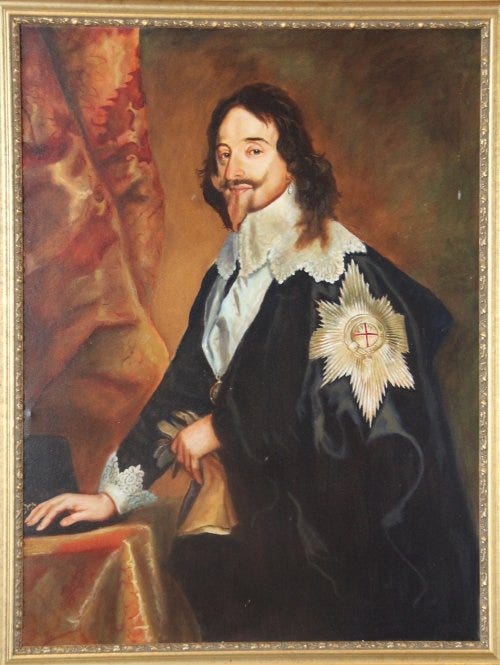Feast of King Charles the Martyr

Today is celebrated by many Anglicans as the feast day of King Charles the Martyr – Charles I Stuart of England – who was beheaded on orders of the Puritan-controlled Parliament (called "Roundheads" for their short haircuts, in contrast to the long hair of the Royalist, and mostly Anglican, "Cavaliers") on the 30th of January in 1649, a despicable act of regicide which amounted to the culminating act of the English Civil War, and began what is sometimes known as the Interregnum (period between kings), prior to the Restoration of the English Monarchy in the person of his son, Charles II, in 1660.
Charles was a controversial monarch, both politically and religiously, at a time when the two were very closely joined indeed. He reigned at a time when Parliament was dominated by Puritan Roundheads, and he defended the prerogatives of both the Established (Anglican) Church and the Crown against strong opposition. Though never a Roman Catholic, he had a "catholic" view of the Church, including the episcopate, and it was ultimately for this that he was unlawfully and unjustly executed by regicides acting under colour of Parliamentary decree, and is believed by many to have thus gained the martyrs' crown.
Excerpts from an account of the King and Martyr, from the late Anglican hagiographer James Kiefer:
"A war which was, in one sense, about taxation, was in another sense about religion. The Parliamentary armies were led by Oliver Cromwell (a collateral descendant of Henry VIII's advisor Thomas Cromwell), a staunch Puritan and a military genius. He began by opposing Charles in the name of liberty, but since it soon became clear that Cromwell himself was no friend to liberty, his battle cry became the Puritan faith. Wherever his troops went, they smashed stained-glass windows and pictures and statues, stabled their horses in churches, and burned vestments and Prayer Books... At the end, when Charles was Cromwell's prisoner, he was required to assent to a law abolishing bishops in the Church of England. He had previously given his consent to such an abolition in Scotland, where the Puritans were in the majority, but here he dug in his heels and declared that Bishops were part of the Church as God had established it, and that he could not in conscience assent to Cromwell's demand. His refusal sealed his doom, and it is for this that he is accounted a martyr, since he could have saved his life by giving in on this question. He was brought to trial before Parliament, found guilty of treason, and beheaded 30 January 1649."
Charles was a keen defender of the Royal prerogatives, but he had a take on this which is perhaps worth hearing today:
"On the scaffold, he said (I quote from memory and may not have the exact words):
"No man in England is a better friend to liberty than myself, But I must tell you plainly that the liberty of subjects consists not in having a hand in the government, but in having that government, and those laws, whereby their lives and their goods may be most their own."
"That is to say, one may reasonably ask of a government that it establish justice in the land; so that judges do not take bribes, so that innocent men are not convicted of crimes, while the guilty are convicted and punished, so that honest men need fear neither robbers nor the sheriff. One may further ask that taxes be not excessive, and that punishments be not disproportionate to the crime. Charles would have said, "Do not ask whether the laws were made by men whom you elected. Ask whether they are reasonable and good laws, upholding justice and the public weal." He would have invited comparison of his record in this respect with that of the Long Parliament (which sat for twenty years without an election, and whose members came to think of themselves as rulers for life, accountable to no one) and Cromwell (who eventually dissolved Parliament and ruled as a military dictator, under whose rule the ordinary Englishman had far less liberty than under Charles)."
Blessed Charles, King and Martyr, pray for us to the Father! Amen.
http://justus.anglican.org/resources/bio/92.html



